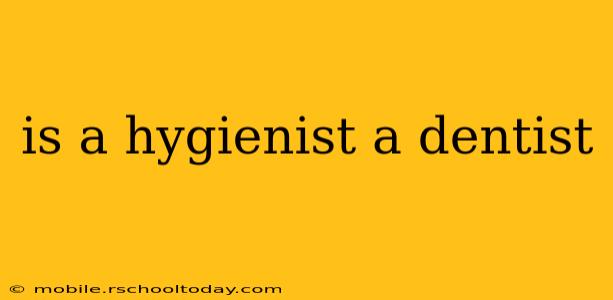Is a Hygienist a Dentist? No, But They're Key Members of the Dental Team
The short answer is no, a dental hygienist is not a dentist. While both work in the dental field and collaborate closely, their roles, training, and scope of practice are distinct. Understanding the differences is crucial for anyone seeking dental care.
What Does a Dentist Do?
Dentists are medical professionals who have completed extensive education and training, including dental school. They are licensed to diagnose and treat a wide range of oral health conditions, including:
- Diagnosing and treating oral diseases: This includes cavities, gum disease (gingivitis and periodontitis), oral cancers, and temporomandibular joint (TMJ) disorders.
- Performing restorative procedures: This encompasses fillings, crowns, bridges, and dentures.
- Performing extractions: Removing teeth.
- Providing cosmetic dentistry: Teeth whitening, veneers, and orthodontics (in some cases).
- Implant placement and surgery: Placing dental implants and performing oral surgery procedures.
- Prescribing medication: Dentists can prescribe antibiotics, pain relievers, and other medications related to oral health.
What Does a Dental Hygienist Do?
Dental hygienists are licensed healthcare professionals who play a vital role in maintaining oral health. Their focus is primarily on preventative care and education. Their duties include:
- Cleaning teeth: Removing plaque and tartar buildup from teeth and gums.
- Providing oral health education: Instructing patients on proper brushing, flossing, and diet for optimal oral hygiene.
- Applying sealants: Protecting the chewing surfaces of teeth from decay.
- Taking X-rays: Assisting in the diagnosis of dental problems.
- Monitoring for oral diseases: Identifying early signs of gum disease, cavities, and other oral health issues.
What are the Educational Differences?
The educational pathways differ significantly. Dentists complete a four-year Doctor of Dental Surgery (DDS) or Doctor of Dental Medicine (DMD) program after completing undergraduate studies. Dental hygienists, on the other hand, typically complete an associate's or bachelor's degree program in dental hygiene.
Do Hygienists and Dentists Work Together?
Absolutely! Dental hygienists and dentists work as a team to provide comprehensive oral health care. The hygienist's preventative work helps identify potential problems early, allowing the dentist to intervene and prevent more serious issues. The hygienist also educates patients on maintaining good oral hygiene, supporting the dentist's overall treatment plan.
Can a Hygienist Diagnose Dental Problems?
No. While a hygienist can identify potential issues and alert the dentist, only a dentist can diagnose and treat dental diseases. Hygienists are not authorized to make diagnoses or prescribe treatment.
Are There Different Types of Hygienists?
While the core functions remain similar, some hygienists may specialize in certain areas, such as pediatric dentistry or periodontics (gum disease). This specialization often comes with additional training and certifications.
In conclusion, while dental hygienists and dentists are both essential members of the dental healthcare team, they possess distinct roles, responsibilities, and educational backgrounds. A dental hygienist is a crucial part of maintaining good oral health, but they are not dentists and cannot provide the same level of diagnosis and treatment.
